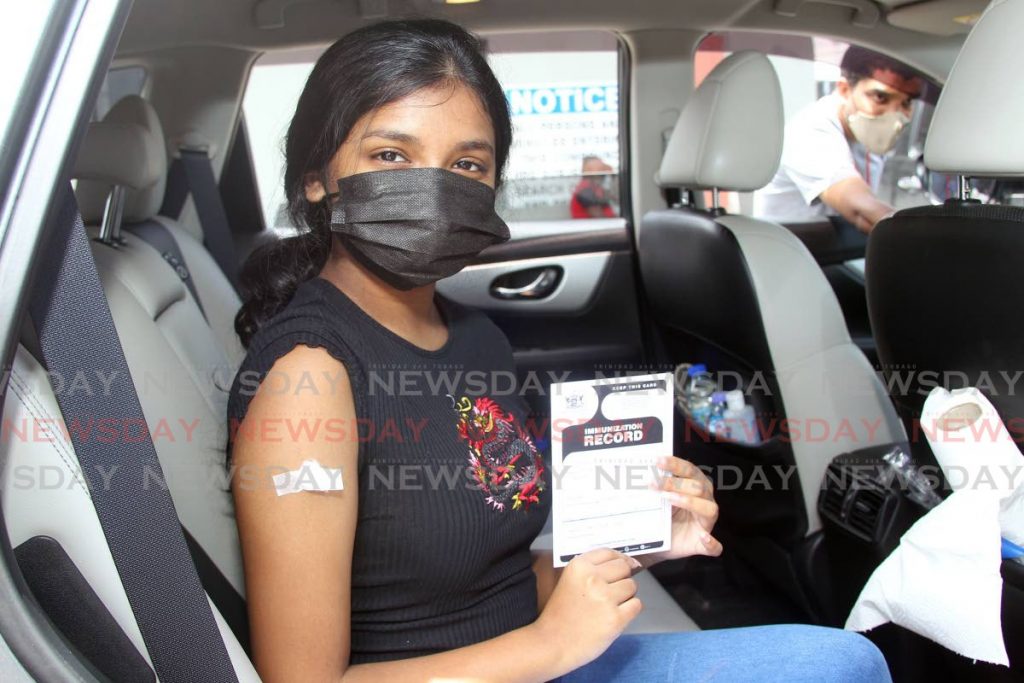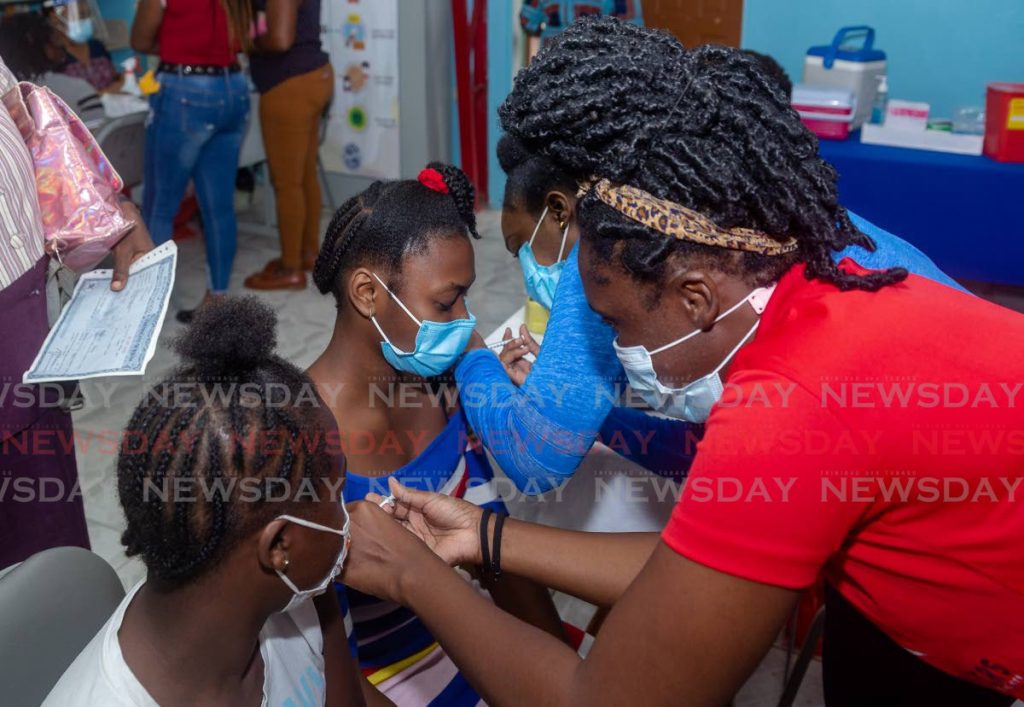Vaccinations a key part of children's health in Trinidad and Tobago

Babies and children have been getting vaccinated in TT for decades, starting at two months old.One paediatrician explained that at that time, the baby gets three injections – one against polio, one against pneumococcal disease and a pentavalent, which covers diphtheria, tetanus, whooping cough, hepatitis B and meningitis. The same is repeated at four and six months.
Around one year old they get one vaccine for measles, mumps and German measles, as well as those for rubella and yellow fever. Between 18 months and two years children are given an oral polio vaccine, and boosters for pneumococcal disease and the pentavalent.
Around age four and a half to five, they are expected to get the oral polio, a shot for diphtheria, tetanus and whooping cough, and a booster measles shot.Between the ages of nine and 12 they usually get boosters for tetanus, diphtheria and yellow fever.The vaccines children receive from birth to age five were mandatory to attend school.
Optional are the human papillomavirus (HPV) vaccine at around age 11 or 12, meningococcal meningitis, chicken pox, Hepatitis A, influenza and the rotavirus vaccine. He told Newsday that, with the topic of children 12-18 getting the Pfizer covid19 on people’s minds, he was surprised he was not getting many calls about concerns.
However, the few who contacted him were concerned about their children getting myocarditis, inflammation of the heart. He advised them to be cautious, as the vaccine was relatively new and that, if they wished, they could delay a month or two to see what other side effects develop. He added that there was a very low chance of children getting seriously ill if they get infected, so there should be “a sense of balance.” He gave parents that advice even as he admitted that Pfizer was a well-known and trusted pharmaceutical company, and that even the national immunisation schedule has been updated over the years as technology improved.
“This is a baby vaccine in the vaccination world. All the vaccines I mentioned go through a process for years and years before they are released to a general population. It’s only now we are starting to see the effects of the vaccine. And in fact I am sceptical about the statistics and risk numbers.”However, one Port of Spain paediatrician believed the concern about the “newness” of the vaccine often came from older generations of doctors who were accustomed to medications taking decades to be developed and released.
She said science continued to evolve and doctors should keep up with the technology. For example, next generation antibiotics were are more efficient, allowing people to take them for three days while it remained in the body for ten.
She explained that mRNA technology had been around for over a decade, but only got the finances to complete it when covid19 appeared. So, while the vaccine was only about 18 months old, the technology had been around for a while. She has had to explain such to parents who “inundated” her office with calls about the Pfizer covid19 vaccine.

Since she knows the children’s medical history, their conditions and the medications they were on, parents wanted her to assure them the vaccine was safe for their children.
In general though, parents were concerned about the mRNA vaccine causing myocarditis and pericarditis as well as the possibility of fertility issues in the future. However, studies showed myocarditis in young people was six times more likely to occur after getting covid19 than after vaccination, especially in teenage boys. She also stressed that the mRNA vaccine could not enter a person’s DNA, and there was no link to infertility. They were also concerned that it was for emergency but she noted that the US Food and Drug Administration fully approved the Pfizer vaccine for those 16 and older on August 23.She recalled a similar situation about eight or nine years ago when the government introduced the HPV vaccine. The virus is linked to cervical cancer and genital warts and a person with HPV could be asymptomatic and not aware they had it. It was first recommended for girls and then for boys as well as males can carry the virus and gave it to females, and it can cause a variety of cancers in males.
“Initially even the Catholic board got involved, because it involves a disease that is sexually transmitted and it was a brand-new vaccine. Parents were afraid that it might affect the fertility of the girls and also the implication that if you give them this they would become sexually active.”Parents and guardians were also concerned because there were no long-term studies of the relatively new vaccine. At the time there were two vaccines on the market, Gardasil and Cervarix. The government got Gardasil, which covered seven strains of HPV, even though it was and still is very expensive.
“The uptake was slow initially, but then it became mainstream, so much so that we (private paediatricians) could access it from the government and give it to male and female patients.”
She therefore advised parents to allow their children to take the covid19 vaccine as soon as possible and resume any other scheduled vaccinations to one months after.“I always tell them I would not give them something I would not give my own child. I have one child and I gave it to her, absolutely.”
She said the Paediatric Society of TT put out a leaflet informing people about the vaccine and also assigned a paediatrician at every vaccination site to answer any questions or address any concerns parents may have.
“Other than for vaccinations, people only bring children to me if they are really sick and they don’t want to go to the public hospital. We don’t have a population who does annual health checks, and that is why people have comorbidities they don’t know about. So you don’t know if your child is going to be the one that would get covid badly.
“TT doesn’t have a robust health care system with limitless resources. We don’t have a lot of paediatric ICU (intensive care unit) beds and we already had a paediatric death. So why would you not listen to the science?

“We are so lucky in TT that we could access this free and get it to our children. We are in good stead with the vaccines available in TT. It’s not politics, it’s science and (the) delta (variant) is mashing up young people. There’s really no excuse to not get vaccinated against covid.”
A paediatrician from St Augustine added that, in the case of her clients, parents were willing to get their children vaccinated with the Pfizer covid19 vaccines, especially with the rise in paediatric cases due to the delta variant, but they wanted to clarify a few issues.
Their main concern was the risk of their children developing myocarditis from the vaccine, but she said the risk of getting multisystem inflammatory syndrome in children (MIS-C) and myocarditis was much higher if they were infected with covid19.
She told them the risk was extremely low and if they got myocarditis, it would be very mild and they would recover well and soon. She said some children develop myocarditis from regular viruses they contract but the average person would not hear about those cases.
She understood that people were wary about such a relatively new vaccine but advised them not to be.“This was done by some of the most brilliant scientists around the world."I know the biggest concern is that the vaccine feels rushed. But this vaccine was developed in the middle of a pandemic, so they had all the world’s resources being put towards it trying to save lives.
“Even though it was released faster than expected, it went through all the clinical trials, so we know it’s safe. I would say not to give in to different conspiracy theories because vaccines work, they always have. And at this point it’s our best bet of getting through this pandemic safely and hopefully ending the pandemic.”


Comments
"Vaccinations a key part of children’s health in Trinidad and Tobago"